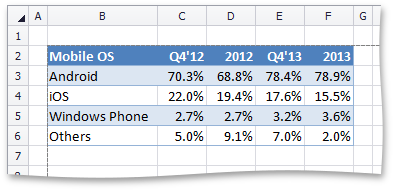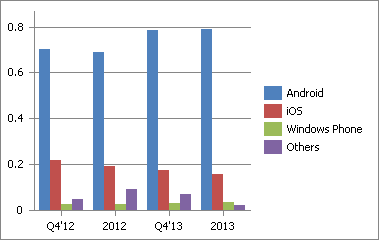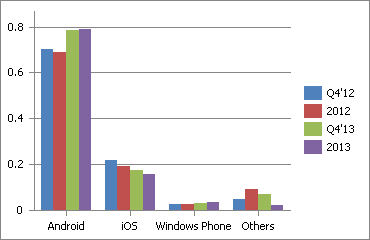ChartObject.SelectData(CellRange) Method
Specifies the source data for the chart.
Namespace: DevExpress.Spreadsheet.Charts
Assembly: DevExpress.Spreadsheet.v25.2.Core.dll
NuGet Package: DevExpress.Spreadsheet.Core
Declaration
Parameters
| Name | Type | Description |
|---|---|---|
| range | CellRange | A continuous cell range that contains chart data. |
Remarks
The SelectData method retrieves data series from the specified range and automatically determines the Series.SeriesName, Series.Arguments and Series.Values for each series. The method automatically determines whether the series data are in rows or in columns.
If the number of rows in a range is greater than the number of columns, the series data are in rows, therefore the rows are placed on the argument (horizontal) axis. If the number of columns is greater than the number of rows, the columns are placed on the argument axis. If the number of rows and columns are equal, the columns are placed on the horizontal axis. To switch rows to columns in the chart, use the ChartObject.SwitchRowColumn method.
This example demonstrates how to create a chart and specify its data using the ChartObject.SelectData method.
The data range looks as follows.

The direction in which the data are extracted is specified by the parameter passed to the method. If the direction equals the ChartDataDirection.Row value, the following chart is displayed.

If the direction equals the ChartDataDirection.Column value, the chart looks as follows.

Worksheet worksheet = workbook.Worksheets["chartTask3"];
workbook.Worksheets.ActiveWorksheet = worksheet;
// Create a chart and specify its location.
Chart chartRowData = worksheet.Charts.Add(ChartType.ColumnClustered);
chartRowData.TopLeftCell = worksheet.Cells["D3"];
chartRowData.BottomRightCell = worksheet.Cells["I14"];
// Select chart data by rows.
chartRowData.SelectData(worksheet["B2:F6"], ChartDataDirection.Row);
// Create a chart and specify its location.
Chart chartColumnData = worksheet.Charts.Add(ChartType.ColumnClustered);
chartColumnData.TopLeftCell = worksheet.Cells["K3"];
chartColumnData.BottomRightCell = worksheet.Cells["N14"];
// Select chart data by columns.
chartColumnData.SelectData(worksheet["B2:F6"], ChartDataDirection.Column);
Related GitHub Examples
The following code snippets (auto-collected from DevExpress Examples) contain references to the SelectData(CellRange) method.
Note
The algorithm used to collect these code examples remains a work in progress. Accordingly, the links and snippets below may produce inaccurate results. If you encounter an issue with code examples below, please use the feedback form on this page to report the issue.